SUMMARY
This is AI generated summarization, which may have errors. For context, always refer to the full article.
- Egypt’s Morsi snubs coup threat
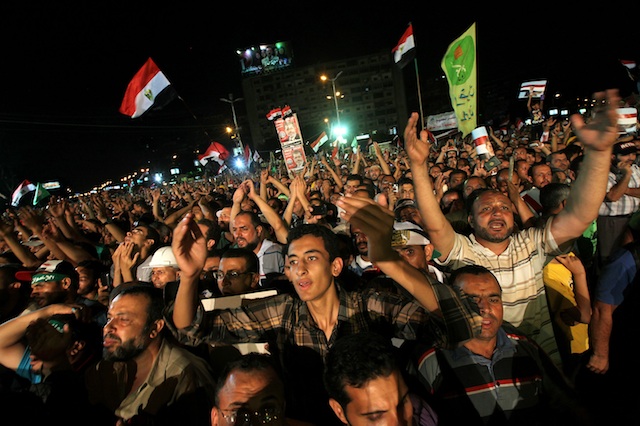 Islamist President Mohamed Morsi snubbed the Egyptian military’s ultimatum for the current leaders to “meet the demands of the people” until July 3 or the army will step in to restore order. The threat of coup comes as Morsi’s opponents camp out in Cairo’s Tahrir Square. Morsi’s government said it would continue on its own path towards national reconciliation, stressing that “the civil democratic Egyptian state is one of the most important achievements of the January 25 revolution,” referring to the 2011 uprising that toppled dictator Hosni Mubarak. Morsi’s supporters in the Muslim Brotherhood say that in defending him, they are defending the legitimacy of the first democratically elected president.
Islamist President Mohamed Morsi snubbed the Egyptian military’s ultimatum for the current leaders to “meet the demands of the people” until July 3 or the army will step in to restore order. The threat of coup comes as Morsi’s opponents camp out in Cairo’s Tahrir Square. Morsi’s government said it would continue on its own path towards national reconciliation, stressing that “the civil democratic Egyptian state is one of the most important achievements of the January 25 revolution,” referring to the 2011 uprising that toppled dictator Hosni Mubarak. Morsi’s supporters in the Muslim Brotherhood say that in defending him, they are defending the legitimacy of the first democratically elected president.
Read more on Rappler. - Croatia joins the EU club
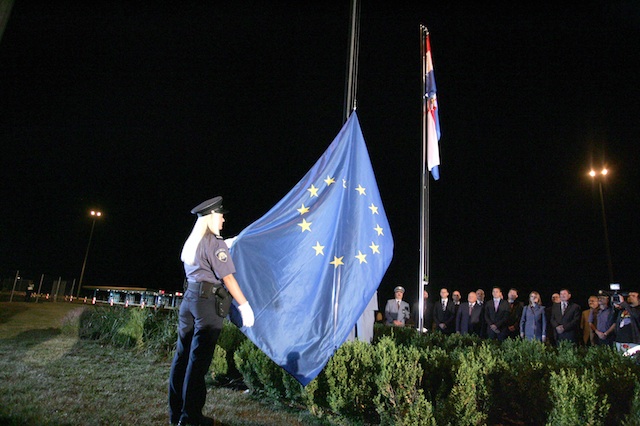 Croatia becomes the 2nd former Yugoslav republic to join the EU bloc. Becoming the 28th member-state of the EU club was “the most important (event) in the history of the country,” according to local papers, which also warned that it was “absurd to expect that the better life will come immediately with joining the EU.” In his celebratory speech in Zagreb, Croatian President Ivo Josipovic vowed not to let the pressure of the debt-wracked eurozone “overshadow our vision and optimism.” German daily Die Welt downplayed Croatia’s hopes. “The next problem child arrives in the EU,” it said. Croatia’s tourism-oriented economy has been either in recession or stagnant for the past 4 years. Unemployment stands at around 20%.
Croatia becomes the 2nd former Yugoslav republic to join the EU bloc. Becoming the 28th member-state of the EU club was “the most important (event) in the history of the country,” according to local papers, which also warned that it was “absurd to expect that the better life will come immediately with joining the EU.” In his celebratory speech in Zagreb, Croatian President Ivo Josipovic vowed not to let the pressure of the debt-wracked eurozone “overshadow our vision and optimism.” German daily Die Welt downplayed Croatia’s hopes. “The next problem child arrives in the EU,” it said. Croatia’s tourism-oriented economy has been either in recession or stagnant for the past 4 years. Unemployment stands at around 20%.
Read more on Rappler. - Filipinos, be more confident — Japanese official
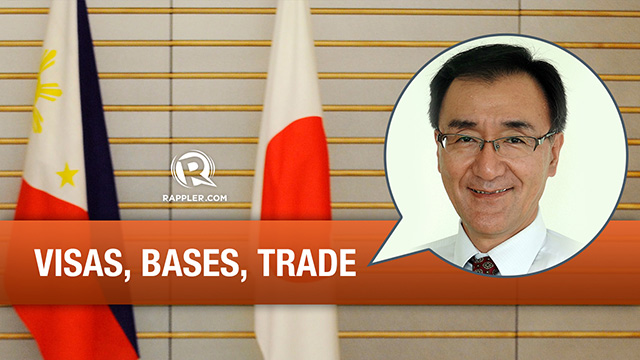
The Philippines’ stellar 7.8% growth in the first quarter and the country’s positive image under President Benigno Aquino III spell a difference in how Japanese companies are looking at the economic potential of its Asian neighbor. Japan’s consul general Keizo Takewaka told Rappler CEO and executive editor Maria Ressa that in the past, Japanese companies “did not fully tap the potential” of the Philippine economy, which was considered a laggard in the region. Now Japanese firms are expanding to the Philippines, students are coming over to learn English, and visas for Filipinos and select Southeast Asian countries have been relaxed. “You can be more confident about yourself,” he said.
Read more on Rappler. - 1 in 10 in world will live in climate-damaged areas — study

One in 10 people around the world in 2100 will live in a place where climate change is damaging at least two major sectors such as crop yields, water, ecosystems or health, according to Proceedings of the National Academy of Sciences, a US journal. Different levels of warming were analyzed, with multi-sector overlap beginning to appear “robustly” at an average warming worldwide of 3ºC above the 1980-2010 average. These so-called climate “hotspots” will be most widespread in the southern Amazon, with “severe changes” in water availability, yields and ecosystems, and in southern Europe, where water shortages and crop failures would lead to hardships for the population. Other hotspots are the tropical regions of Central America and Africa, as well as the Ethiopian highlands, and the northern regions of south Asia.
Read more on Rappler. - Nancy Binay receives P137-M campaign contributions
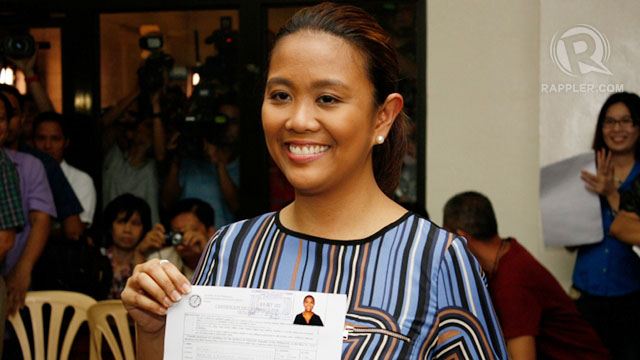
Senator-elect Nancy Binay received P136.87 million total contributions from 1,228 donors who gave amounts ranging from P500 to P5 million, according to her submissions to the Commission on Elections. This means the daughter of Vice President Jejomar Binay received more than 25% of the combined P537.9 million funds donated to the 9 senatorial candidates of opposition United Nationalist Alliance (UNA). Overall, the 11 administration senatorial slate of Team PNoy received the most in campaign contributions at P894.09 million. All the 11 independent and 3rd party candidates received only P22.15 million.
Read more about UNA campaign contributions
Read more about Team PNoy campaign contributions - Ex-PH president takes oath as lawmaker in hospital
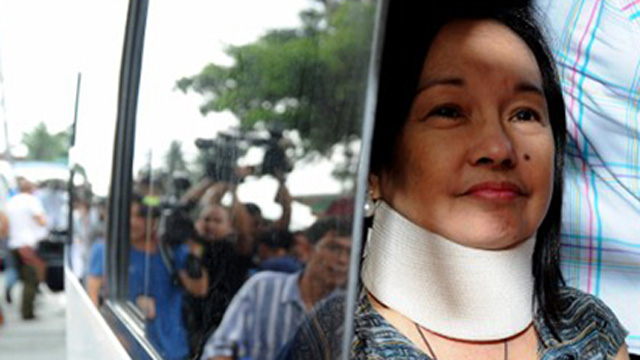
Former President Gloria Macapagal-Arroyo took the oath for her second term as Pampanga Rep over the weekend while in hospital detention. Since October 2012, Arroyo has been in a presidential suite at the Veterans Memorial Medical Center (VMMC) in Quezon City where is detained for plunder. She was accused of allegedly misusing P366 million of intelligence funds during her 9-year term as president. Despite being in hospital detention, Arroyo overwhelmingly won against her opponent in her hometown in central Luzon in the May 2013 mid-term polls.
Read more on Rappler. - SSS rides real estate boom, sells Fort property

State-run pension fund for private sector employees Social Security System (SSS) is selling a real estate property in its portfolio to take advantage of the rising land values. SSS officials announced that it has set at P2.24 billion the minimum bid for the 8,300 sqm prime land it owns in the aggressively growing business district, Bonifacio Global City. That translates to a selling price of P269,894 per sqm. SSS chair Juan Santos said developing properties is not its core business. The pension fund is an institutional investor in the local capital markets.
Read more on Rappler. - Calling app developers: Help ease traffic

The Department of Transportation and Communications (DOTC) is looking to technology to help lessen the stress on motorists and commuters caused by traffic. The agency launched a 3-month competition to develop new application to help motorists choose the best routes for their travels in Metro Manila at a particular time. App developers can use the database of the Philippine Transit Information Service (PTIS), a 2-year initiative to gather and organize data on buses, jeepneys, and trains. To build the PTIS, the DOTC used GPS, or Global Positioning System technology, to pick up data on more than 900 bus, train, and jeepney routes. It also gathered fare information and transit times using the various transport types. The apps have to indicate the types of transportation and number of transfers that will be involved, as well as how much it will cost and how long it will presumably take to get to a particular destination.
Read more on Rappler. - Why Olympic spotlight is on Lausanne
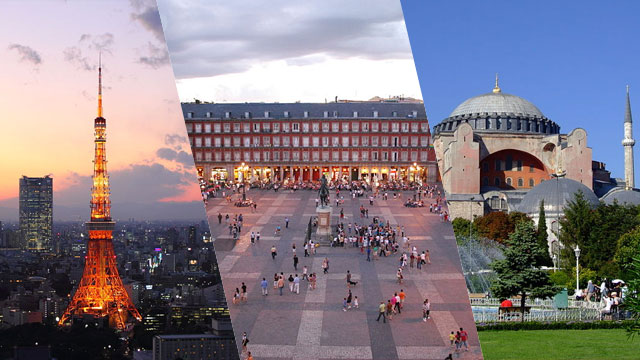
The Swiss City of Lausanne will be an Olympic electioneering “hotspot” this week due to two events: 3 cities are bidding for the right to host the 2020 Summer Olympics and 6 men are vying to succeed Jacques Rogge as International Olympic Committee (IOC) president. These parties will make presentations to their electorate the IOC members on July 3, although final decisions for both will come in September in Buenos Aires, the host of the 2018 Youth Olympic Games. The 2020 Games bid teams are coming from Istanbul, Madrid and Tokyo, while the contenders to replace Rogge will outline their vision to keep the Olympic ideals intact amid illegal gambling and doping scandals, as well as how to keep the games in a reasonable size and not getting bigger and more expensive to put on. German IOC vice-president Thomas Bach is still seen as the favorite to take a post.
Read more on Rappler. - Why Mark Zuckerberg joins gay pride parade

About 70% of Facebook members in the United States are connected to a friend who has identified themselves as gay, lesbian, or bisexual at the social network, according to Facebook’s Alex Walker and Robert D’Onofrio. This was likely why Facebook chief Mark Zuckerberg joined more than 700 of the leading social network’s employees to march in a euphoric San Francisco Gay Pride Parade that drew more than a million people. Taking part for the 3rd year, Zuckerberg and others in the Facebook contingent used ink pads and rubber stamps to temporarily brand “like” onto people’s skin as the 250 official parade entries made their way through the heart of San Francisco last June 30.
Read more on Rappler.
Add a comment
How does this make you feel?
There are no comments yet. Add your comment to start the conversation.